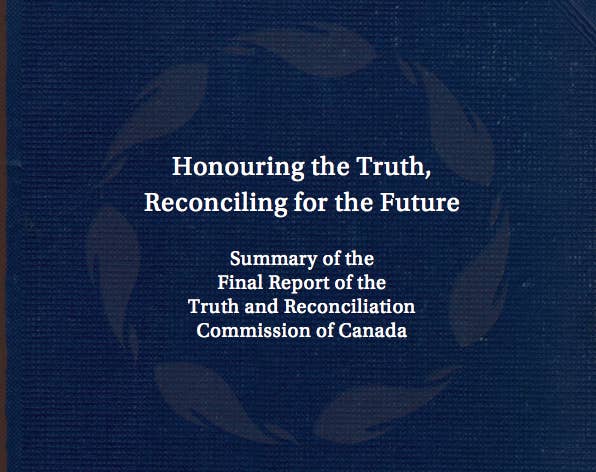The Truth and Reconciliation Commission's summary report on Canada's dark legacy of sending Aboriginal children to residential schools was released Tuesday.

They concluded the program, which spanned more than a century, is what many have been calling it all along: genocide.

The report included 94 recommendations for how Canada can make amends and heal in the wake of the schools program.
The calls to action include eliminating the education funding gap for First Nations kids, protecting Aboriginal languages, improving Aboriginal health care, and taking the impact of the residential school system into account in child welfare decisions. It also calls for a national monument in Ottawa and urges an official apology for the Pope for the Church's role in the abuse.
Central to all this is recognizing the lasting impact of a program that saw 150,000 First Nations, Metis and Inuit children taken from their families.
To the commission, reconciliation means “coming to terms with events of the past in a manner that overcomes conflict and establishes a respectful and healthy relationship among people, going forward.”
Aboriginal people in Canada are now using the hashtag #MyReconciliationIncludes to describe how to do just that.
#MyReconciliationIncludes not being punished for talking about equity issues and the abuses that have occurred.
The hashtag was started by Christi Belcourt, a Métis artist on May 29, soon after Chief Justice Beverley McLachlin referred to the school system as “cultural genocide” in a speech.
#MyReconciliationIncludes acknowledgement of the attempted "genocide" of Indigenous Peoples. Starvation policies were more than "cultural."
"For the most part, indigenous people have been carrying the weight of the [commission]," Belcourt told BuzzFeed Canada.
"The vast majority of the country turned a blind eye to the process. They turned a blind eye for hundreds of years."
The question of reconciliation and how to mend the centuries "of complete displacement and devastation" indigenous people have faced is one already being discussed, said Belcourt, but now everyone needs to join in.
"We have very serious concerns and they’re not being resolved," she said. "It shouldn’t be on the shoulders of us, it has to be embraced by Canadians across the country."
#MyReconciliationIncludes complete overhaul of Canadian system away frm Eurocentric colonial control and norms.
#MyReconciliationIncludes understanding how pompous & offensive it is to teach history stating HBC "owned" half the country.
#MyReconciliationIncludes the right to occupy & be present on the land to continue traditional practices without interference by "officials"
Tanya Tagaq, a Polaris Prize-winning Inuk throat singer from Nunavut, also joined in.
#MyReconciliationIncludes not being called an activist just for demanding human rights
#MyReconciliationIncludes working therapy into the school curriculum in Nunavut. Give children tools to cope.
#MyReconciliationIncludes abolishment of the myths that keep alive the undercurrent of abject racism
Others continued the call for a national inquiry into the 1,200 Aboriginal women who have gone missing or been murdered over the last 30 years.
#MyReconciliationIncludes a national public inquiry on murdered & missing Indigenous women and girls #MMIW
#MyReconciliationIncludes acknowledgement that indigenous women are valued & recognized as human beings #MMIW
The environment, Bill C-51, and preserving cultures in the face of colonialism were also touched upon.
#MyReconciliationIncludes not being funded by the resource extraction firms that perpetuate violence upon Indigenous bodies and land.
#MyReconciliationIncludes not labeling Indigenous peoples as terrorists when they resist extraction efforts on their ancestral homelands
#MyReconciliationIncludes centering those who have been most vulnerable to colonialism: two-spirit people/women.
The question now is how to improve the future for Aboriginal youth and what role the Canadian government will be willing to play in getting there.
#MyReconciliationIncludes teaching every student in Canada about this dark chapter in Canadian history
#MyReconciliationIncludes never being told that my culture is a burden or a deficit to overcome.
#MyReconciliationIncludes a fully-funded action plan in every nation for language revitalization--designed and led by Indigenous people.
#MyReconciliationIncludes a federal government that won't ignore the 94 recommendations in the TRC final report.
